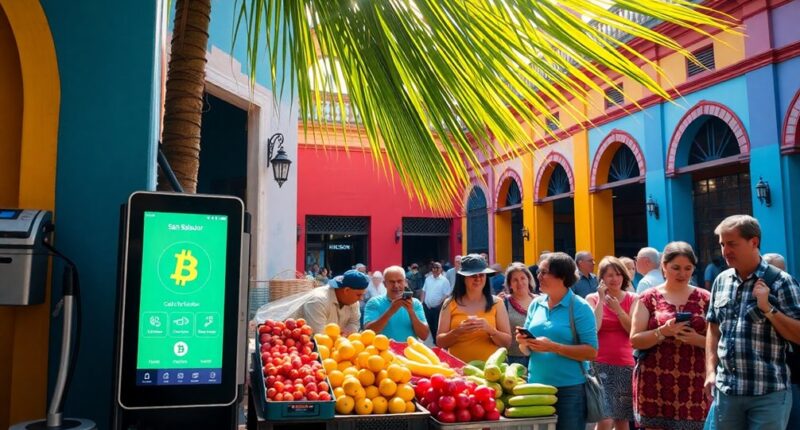You're likely wondering how Bitcoin's journey in El Salvador has evolved since the IMF agreement. The currency still holds its ground as legal tender, and the Chivo wallet is making waves among the unbanked. While there's been a slight uptick in tourism and foreign investment, the shadow of price volatility looms large. So, what does this mean for the country's fiscal management and its ambitious cryptocurrency initiatives?

Since El Salvador adopted Bitcoin as legal tender, the landscape has shifted significantly following the recent agreement with the IMF. The legal tender status of Bitcoin remains, but now businesses have the option to accept it voluntarily rather than mandatorily. This change marks a pivotal moment in how the country interacts with cryptocurrency and reflects the IMF's concerns regarding financial stability risks associated with Bitcoin.
Despite these alterations, the Salvadoran government continues to demonstrate its commitment to Bitcoin initiatives. Private sector involvement is thriving, with various Bitcoin wallets operating independently of government oversight. This shift reduces the government's role, allowing the market to dictate the pace and scale of Bitcoin adoption. Enhanced transparency and regulation of digital assets are also part of the agreement, fostering a more secure environment for users and investors alike. Furthermore, the Chivo digital wallet was launched to facilitate Bitcoin transactions and initially offered $30 in Bitcoin to encourage usage.
Economically, the initial Bitcoin experiment has seen modest impacts, including a slight increase in tourism and foreign investment. However, concerns linger regarding financial stability. The IMF and other organizations have voiced apprehensions about Bitcoin's price volatility, which poses risks for fiscal management. While Bitcoin has made some remittance transactions easier, it hasn't significantly disrupted traditional services. Still, it has provided financial access to some unbanked individuals through the Chivo wallet, showcasing its potential for financial inclusion.
The government's approach to the Chivo wallet is evolving. Plans to sell or shut it down mean that the private sector will likely take the reins in this area, further limiting public sector involvement in Bitcoin-related activities. Additionally, taxes must now be paid in U.S. dollars instead of Bitcoin, signaling a shift back toward traditional financial systems.
Looking ahead, the $1.4 billion IMF loan supports crucial economic reforms and aims for fiscal stability. This agreement could encourage further financial backing from other international institutions, bolstering the Salvadoran economy during turbulent times.
Recent market optimism, partly spurred by U.S. crypto policies, has positively influenced Bitcoin's value, reflecting the interconnectedness of global cryptocurrency trends.
El Salvador's experience serves as a valuable case study for other nations contemplating similar initiatives. As the country continues to grow its Bitcoin reserve, the path forward remains dynamic, with lessons to be learned and challenges to navigate in the ever-evolving world of cryptocurrency.









